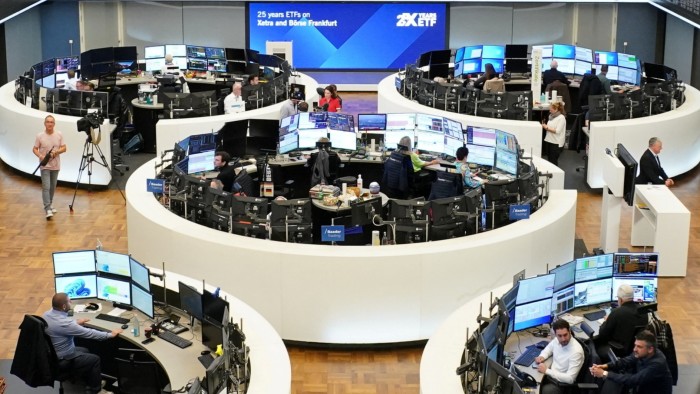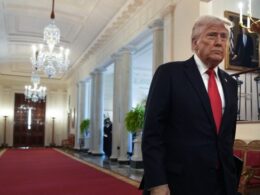Unlock the Editor’s Digest for free
Roula Khalaf, Editor of the FT, selects her favourite stories in this weekly newsletter.
The rapid plunge in European stocks sparked by Donald Trump’s tariffs has wiped out gains for the year, dashing investor optimism that the region’s markets would be a beneficiary of the US president’s trade war.
The Stoxx Europe 600 index has tumbled 9 per cent since Trump sent equities around the world into a tailspin by announcing levies on US imports on April 2 that were more aggressive than expected.
Although markets rebounded on Tuesday, the sell-off has bruised investors who piled into European shares earlier in the year in a bet that fiscal stimulus and increased defence spending would help markets that have long lagged behind Wall Street play catch-up.
Now, analysts warn that a 20 per cent tariff on US imports is likely to wreck the region’s growth prospects.
“President Trump’s tariff shock is so large that it virtually guarantees that an already fragile Eurozone will suffer a mild recession in the middle of 2025,” wrote Mathieu Savary, chief European strategist at BCA.
Of the Eurozone’s €500bn of US exports, €400bn are subject to tariffs, according to a report from Jefferies.
That is likely to hit profits, particularly given that Europe’s biggest indices are dominated by export-focused companies.
European automaker shares have fallen sharply in recent weeks, one of the worst performers in the Stoxx 600. Producers such as Stellantis have high exposure to the US economy. The carmaker depends on Mexican and Canadian plants for its US sales, the bulk of Stellantis’s group revenues.
Analysts at Goldman Sachs on Tuesday downgraded their earnings forecast for European stocks. They expect earnings per share to fall 7 per cent on the Stoxx 600 this year, compared with a prediction of a 2 per cent increase before the tariff bombshell.
Earlier in the year, Europe’s major stock markets had risen even as trade jitters held back US equities.
Defence companies led a rally as investors responded to German chancellor-in-waiting Friedrich Merz’s “whatever it takes” plan to unleash defence spending and overhaul the country’s infrastructure — that could provide the largest economic stimulus since the fall of the Berlin Wall.
Economists had anticipated as much as €1tn in additional domestic spending in the next decade, well over a fifth of German GDP.
The proportion of fund managers saying European shares looked undervalued relative to global peers reached its highest in six years, according to a Bank of America survey in February.
Following years of underperformance, the forward price earnings multiple of the Stoxx 600 is a third lower than the equivalent valuation measure for the S&P 500.
But that relative preference for Europe has not helped investors during the recent sell-off, which has swept markets around the globe.
“When markets melt down, regional equities tend to all look the same,” said Luca Paolini, chief strategist at Pictet Asset Management.
Some sectors that led the way earlier in the year have been among the hardest hit, as investors back out of previously winning trades.
Banks on the Stoxx 600 — which are highly sensitive to the outlook for the economy — have tumbled 14 per cent since last week’s tariff announcement.
“What has gone up the most recently may go down the most, as investors are being forced to de-risk,” said Emmanuel Cau, head of European Equity Strategy at Barclays.
Analysts also worry about a further escalation of the trade war. A near-term US-EU trade deal remains unlikely, according to BCA’s Savary.
Although the EU has not immediately retaliated in the manner of China’s 34 per cent reciprocal tariff late last week, an uneasy stand off exists between the two sides, not helped by scheduling issues.
“Talks will be delayed until the third quarter as the Trump administration focuses first on renegotiating agreements with Canada and Mexico — negotiations that will only begin in earnest after Canada’s federal election on April 28,” he said.
This persistent uncertainty only adds to Europe’s existing vulnerabilities, noted BCA. Even before the trade war, industrial production was weak across most categories, except for non-durable goods.
Industrial production in the EU has not risen above zero year on year since April 2023, according to Eurostat data.
“Germany’s fiscal package is sizeable, but the challenge for markets is assessing how much of it can offset the growing drag from trade tensions,” said Sutanya Chedda, equity strategist at UBS. “The US tariffs have hit sentiment at an already fragile moment for an export-heavy economy.”
Source link









